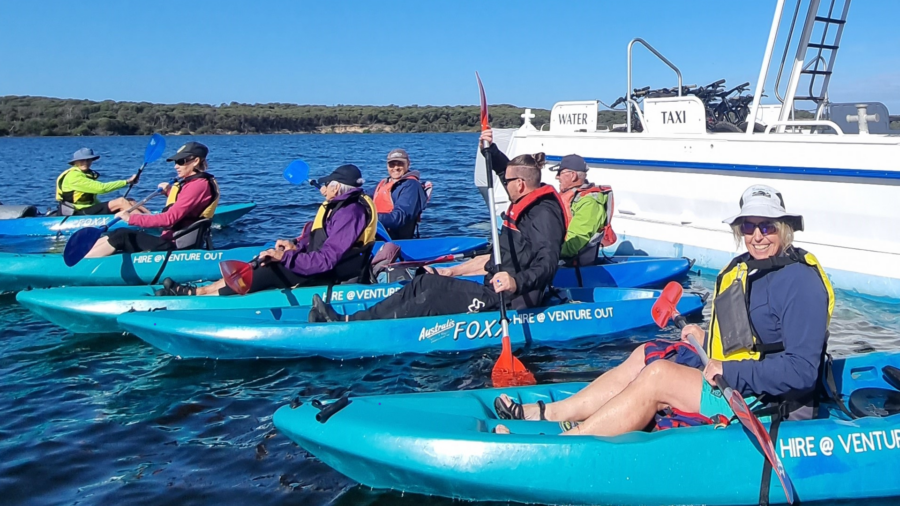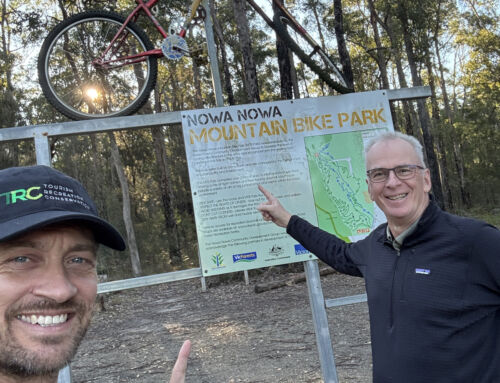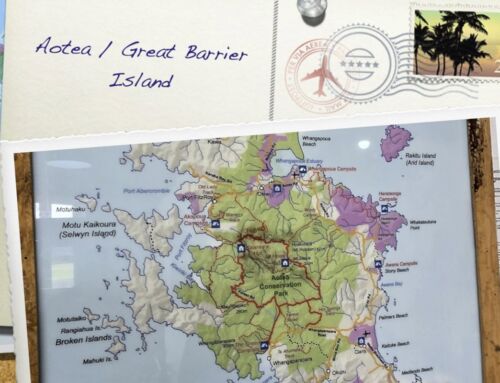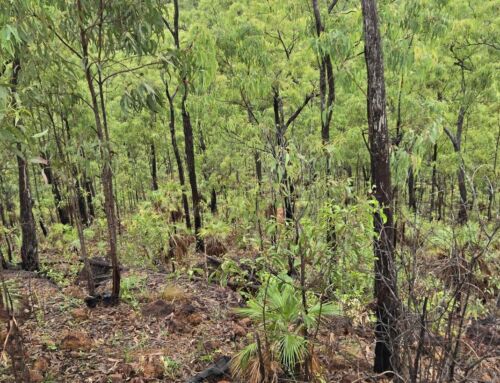As TRC Tourism continues to work with Destination Gippsland on the development of the Gippsland Lakes Aquatic Trail (GLAT), consultant Chris Ord reflects on the recent product test of its signature experience tour offering.
Proof is in the pudding they say, but when it comes to designing high-quality, nature-based experiences, there are many items on the tour menu that must tickle a guest’s fancy beyond a dessert choice of artisan salted caramel ice cream, or pear with oat and coconut crumble. Yes, this is a real choice, at The Local in Metung, Gippsland. And yes, the only real choice was to have both.
When creating a tour, there comes a point in the planning process where ideas, mapping and logistics (including the dessert menu) need to move off computer screens and into the real world. Just like any other product being launched to a market, a tour needs to be ‘stress tested’. The primary query to be answered is: Is the planned experience as high-quality as imagined?
But beyond that critical enjoyment quotient there are many more vital elements to a tour design jigsaw. The alchemy includes activities, transfers, guides, accommodation, equipment, catering and – most importantly – safety, risk exposure and redundancy planning. This is never more true than when the tour in question is to take place in the outdoors, where some elements will always be beyond the tour operator’s control, making thorough planning even more crucial to success.
With this in mind, TRC Tourism consultants, Nick King, Jo Larkin and Chris Ord recently took on the taxing (tongue firmly in cheek) task of ‘testing’ a planned multi-activity tour in the Gippsland Lakes, Victoria. Their laborious job (tongue now in other cheek) was to host and guide a small group of ‘target market’ guests on a string of paddling excursions, walks and mountain bike rides exploring the highlight environs of the Gippsland Lakes.
Located on the State’s eastern seaboard, ‘the Lakes’ consists of a series of coastal lagoons and wetlands extending from Sale Common to Lakes Entrance, covering approximately 60,000 hectares. They are the culmination waterway of seven major rivers and connect to the wild Southern Ocean via a narrow channel at Lakes Entrance.
Of particularly high conservation value, the Lakes are listed as a wetland of international importance under the Ramsar Convention, a designation of sites containing representative, rare or unique wetlands, or wetlands that are important for conserving biological diversity. They host habitat for resident and migratory waterbirds, diverse and abundant marine life, and threatened species. They are also home to one of only two known populations of the rare Burrunan dolphin. With stunning inlets and beaches, low lying heathland, abundant trails, some of the state’s best up-close bird watching opportunities and outstanding Aboriginal cultural values, the Gippsland Lakes makes an ideal playground for immersive adventures.
The endless list of attractions paired with experienced and welcoming outdoor tour operators makes the Gippsland Lakes an ideal canvas for the curation of multi-activity experiences that delve into the region’s impressive environments. The momentum to develop these tours was initially seeded by the Gippsland Tracks and Trails Feasibility Study, a report authored by TRC Tourism that recommended undertaking “feasibility and market testing for a multi-day multi format trail that provides commercial opportunities based on the outstanding Gippsland Lakes.”
And so, the innovative Gippsland Lakes Aquatic Trail (GLAT) came to life as a concept to further develop destination-based tourism leveraging the Lakes’ significant attractions.
TRC Tourism was further charged with the task to develop GLAT as a signature trail experience, a process that culminated in four ‘foundation trail’ products that could be undertaken by visitors in a variety of ways, on a variety of timelines, and appeal to a variety of outdoor active markets. The walking, cycling and water-based journeys amounted to true ‘choose your own’ adventures catering to all skill and experience levels and a myriad of outdoor recreation interests, while highlighting the natural, historic, and cultural features of the region. The core tenant was to position the Gippsland Lakes as Australia’s premiere destination for aquatic environment adventures.
With activities selected, points of interest honed-in on, and itineraries carefully developed, the next logical step was to test the waters, quite literally. Which is how our TRC consultants found themselves paddling the Lakes alongside six invited guests including representatives from Destination Gippsland and Parks Victoria, and profiled target market ‘guinea pigs’, all briefed to give honest and frank feedback at the end of their three-day test tour.
Prior to being armed with a paddle and personal floatation device, the group had been welcomed by the Gippsland Lands and Waters Aboriginal Corporation (GLaWAC) at its art gallery, café and soon to be cultural hub offering visitors the opportunity to learn about Gippsland’s vibrant Aboriginal cultural heritage, its communities and stories. In developing the GLAT, the Gunaikurnai Aboriginal community has been integral to ensuring Traditional Owner custodianship, history and stories are reflected in tours and experiences where appropriate.
With a Welcoming Ceremony complete, the small group quickly found themselves on a short kayak paddle to Nyerimilang Park, a heritage homestead property perched high on an escarpment, and the site of a walk taking in an eco-camp development proposed as part of a GLAT high-end tour. The imagined eco camp would mirror a second, potentially located on Rotomah Island, which would be visited on the final day of the test tour. These accommodations would aim at a tour market seeking a more facilitated, yet still immersive experience, while others (such as our group) could choose to stay in one of the many lakeside villages in a variety of hotels, holiday lets and B&Bs, or campsites.
Paddling into the sunset on Day One, exploring the still-water environs and birdlife of Bancroft Bay, our guests were briefed that tours would indeed be designed to time with glorious sunsets (as ours) where possible, with foul weather plans of motorboat support meaning comfort and safety options would always be available.
The what-if mindset of a tour guide must pervade all planning, with every eventuality predicted and planned for, with comfort and enjoyment in mind but always with safety as the baseline priority. This is where operators such as skipper Rob Ashworth from H2O Adventures, and Sarah Carlisle, our kayak lead from Venture Out, are lynchpins: as tours emerge from the GLAT trails, they will be at the frontline in delivering experiences on the ground. Having them along for the test tour, was critical to assess feedback, equipment and transfer logistics and the one thing desktop planning can never capture: local knowledge. Their input into the final GLAT tour design will be as valued as our guests’.
Indeed, as if to test our tour hypotheses to the limit, weather threw in a squally curveball, forcing a day-swap of itinerary and rescheduling of activities. Such logistical flexibility is important in any outdoor adventure tour planning and testing the experience design capacity was a good proposition on two fronts: it stress-tested our redundancy planning while also opening up the timeline to enable a sunset visit to the Metung Hot Springs, an off-trail added attraction that sat seamlessly in the ‘soft adventure’ package being rolled out.
The following days saw our guests immersed in meandering bike rides, a paddle up Bunga Arm, a visit to the famous Ninety Mile Beach, a second paddle to the Ramsar-listed bird watching paradise of Rotomah Island, and a final day choice of exploring Sperm Whale Head by bike, or a coastal walk back to Loch Sport. A final boat transfer home was an opportunity for the test participants to offer their initial feedback to assist in massaging the tour design another step closer to market readiness. GLAT Product Test participants were also asked to complete a follow-up online evaluation survey, which revealed that the experience had overall far exceeded expectations throughout the 3-day itinerary, an early success considering most participants had never heard of the term ‘Aquatic Trail’ before, and most of the trails experienced were in an undeveloped state.
Operators engaged in the itinerary were impressed with the assembled components, with the general consensus being that the kayaking and walking activities were ready to be activated in some embryonic form straight away. Such first-step tour offerings, while not the complete imagined package, play an important role in building early demand and therefore impetus for the infrastructure investment required to grow the product through to maturity.
Until such time as all four GLAT itineraries can fully come to life, short, taste-tester tour experiences will offer proof in the tour pudding and serve as a solid foundation for the future of the planned Gippsland Lakes Aquatic Trails. As will the existing dessert (and pizza) menu at The Local in Metung. Having tried it out, we highly recommend the Metung Hot Springs prior. Trust us. We’ve well and truly tested it out.
TOP TEN TOUR DESIGN FACTORS
- Safety, safety, safety – the bedrock of any tour design is risk management, especially in nature-based settings.
- Sustainability and sensitivity – environmental, cultural and community; your tour should Leave No Trace and always seek to give back to the local community and landscapes in which it operates.
- Order of activities – when considering multi-day and multi-activity, it is important how you structure your day-to-day itinerary. It should ‘flow’ and allow plenty of time to undertake each activity without being rushed and with allocated time for rest.
- Target market capabilities and expectations – know your target participant for any one tour, and communicate with guests so they understand the skills, fitness and experience required (or not) for particular activities.
- Serviceability – do your transfer logistics work? Are there enough operators to fulfil demand? Are they flexible? Are your timelines realistic?
- Quality of experience – across all aspects from the points of interest and landscapes to the quality of the equipment you use, to the hospitality, knowledge and confidence of your staff.
- Redundancy planning – cover off the what-ifs, have back up plans to three levels and remain flexible.
- Accommodation and catering – is there enough, with the correct capacities, at the right budget, to cover the tastes of your intended market? And the food … it’s important! Make it better than good.
- Added values – it’s not just the on-trail experience that matters. What other attractions can you plug in to? Other services such as spas, massages, galleries, markets – even on a trail-focused tour it’s not always about the trail.
- The finishing touches – the little things: welcome packs, pre-trip information and communication, surprise foodie stops, introductions to local legends (artists, wine makers, gatekeepers of local knowledge). It’s the little things that often count the most, especially towards the ‘story’ of the tour.
Background on the GLAT experience development:www.visitgippsland.com.au/destination-gippsland/about/industry-resources/gippsland-lakes-aquatic-trail
Full evaluation of the GLAT tour testing can be found here: https://assets.visitgippsland.com.au/documents/GLAT-Product-Test-Evaluation-Report-24-May-2023.pdf






